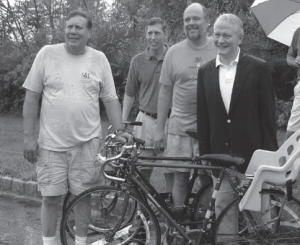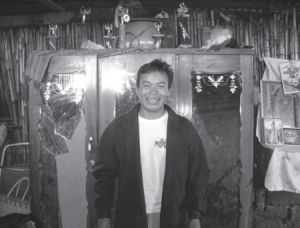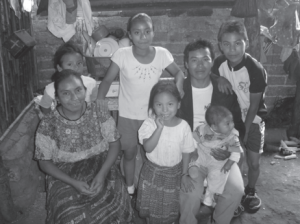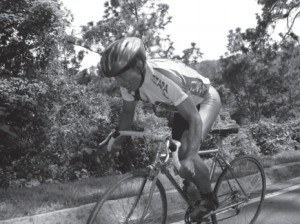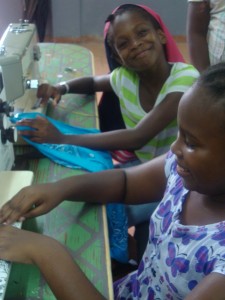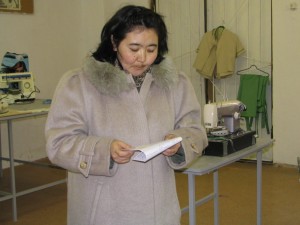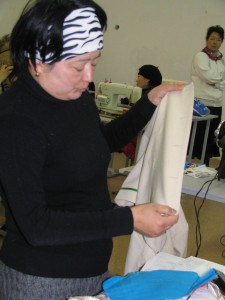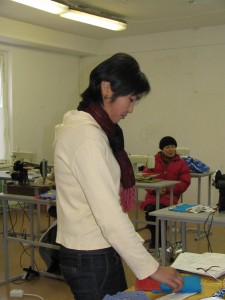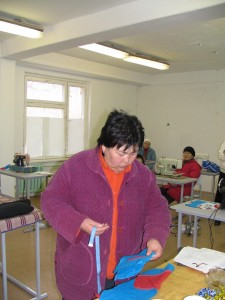All posts by admin
Pedals for Progress is proud to sponsor the presentation by Señora Maria Margarita Caté at the Hunterdon Medical Center auditorium
Friday April 20th, 2012, 7:30PM – 9PM
Señora Margarita is the founder of the Guatemalan foundation FIDESMA (Foundation for the Environment and Sustainable Development). The mission of FIDESMA is to promote the sustainable development of families and communities by promoting programs and projects in the areas of education, with technical assistance and economic aid for conservation, and protection of the environment in the rural regions of Guatemala. P4P has sent over 6,000 bicycles and close to 200 sewing machines to FIDESMA since 1999 to help support these programs.
Señora Margarita will give the presentation explaining in detail their programs that they run from their foundation headquarters in the rural highlands of her native country. FIDESMA has established facilities in San Andres Ixtapa from which they implement their programs in all of the surrounding communities.
Joining us will be documentary filmmaker Greg Sucharew sharing his trailer for the upcoming The Bicycle City. Based in Rivas, Nicaragua, this is “the story of the struggle, determination, idealism, and hope that has brought about the transformation of an entire society.”
For all of the supporters of Pedals for Progress and for those interested in discussing the sustainable and measurable success of partnering with a nonprofit, this is a wonderful opportunity to hear first-hand how American bicycles and sewing machines have had a significant impact on many Guatemalan and Nicaraguan lives and how important it is that we are able to continue supporting FIDESMA and related endeavors.
Gifts-in-Kind
60 Sewing Machines from Pedals for Progress
Yemen is the poorest country in the Arab world and consistently ranks at the bottom of the United Nations Development Index. Still, for those fleeing war, persecution, and famine in the Horn of Africa, it is both a transit country and destination. With an estimated 210,000 refugees in Yemen, the capital city of Sana’a hosts one of the country’s largest urban refugee populations. With high levels of unemployment across the country, especially amongst the refugee population, livelihoods opportunities are hard to come by.
In 2011, IRD Yemen received 60 sewing machines from Pedals for Progress as a donation to support its UNHCR funded program, Community Services Assistance to Urban Refugees. The aim of the program is not only to support urban refugees, but also to add value to other organizations’ programs that support refugees in the capital city of Sana’a. As such, IRD works closely with a local NGO which provides vocational training services to female refugees and Yemeni women alike. From the in-kind donation, a total of 64 women (42 refugees and 22 Yemenis) are being trained on the sewing machines, of whom 50 of the top graduates will be rewarded with the actual machines upon graduation. In this way, the beneficiaries will not only have learnt the skills to develop livelihoods opportunities for themselves but they will also have the equipment to do so.
One of the challenges faced with this donation concerns the model of the sewing machines. Singer, the company that produces the machines, does not operate in Yemen and hence spare parts and maintenance services are not readily available. As such, 50 of the machines are being used for training while 10 of the lesser quality second-hand machines are being used for spare parts.
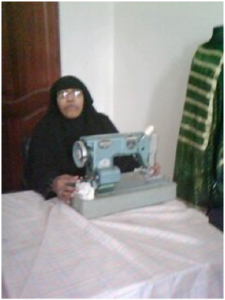
1st European Convention of Environmental Laureates
For many decades, on the wall next to my computer, there has been an AT&T poster with a photograph of the moon in the night sky and a very large Saturn, Jupiter and a third planet, maybe Pluto, in the background. In white letters in the night sky the poster reads “Don’t recycle. We can always move.” That seems to be the motto for many nations. Just shift the burden to another location or leave the poisoned one behind. I’ve never agreed with this mentality and, through P4P, have made a point to cross international boundaries not with pollution, but with productive recycled materials. We don’t need to make more, we need to use what we have—and share it.
I have been fortunate to earn recognition for my efforts and now, by virtue of having become a Rolex Laureate in 2000, I have been invited to participate in the 1st International Convention of Environmental Laureates in Freiburg Germany in March, 2012.
The Convention is an academic platform for those who have earned various prestigious prizes for marked accomplishments on behalf of the environment in Europe and other international locations. The goal of this convention is to push “for the development and adoption of ‘The Declaration on Rio +20 by International Convention of Environmental Laureates,’ which aims to send a positive signal for achieving ambitious climate and sustainability goals and necessary innovations.”
I’m already packing my bags, suit and all, and while I’m humbled by the recognition, I plan on grabbing this opportunity to push for the very real and necessary changes to international environmental standards and cooperation. After all, how useful are bicycles on the moon?
For more information on the convention and the European Environment Foundation go to or click on the following link: www.european-environment-foundation.eu
P4P Collects—and Follows—the 100,000th Bicycle!
by Reykha Bonilla
InGear Fall 2006
2006 was a remarkable year for Pedals for Progress. We reached two important milestones, our 15th anniversary and our 100,000th bicycle. While we’re proud of our longevity, the second accomplishment symbolizes so many things for Pedals for Progress. It’s the culmination of 15 years of hard work and dedication from Dave Schweidenback, the P4P staff and countless volunteers. It means 100,000 bicycles have been saved from landfills here in the United States, and at least 100,000 Americans have been connected to the larger global community through our work. And most important, 100,000 of the world’s working-poor families now have a better chance to earn a decent living. Our 100,000th bicycle showed up at a collection sponsored by the Somerset Hills Kiwanis on June 24th at the Sunset Inn in Clinton, N.J. On hand to commemorate the occasion and read a proclamation was New Jersey State Senator Leonard Lance, who personally thanked the surprised donor, Bob Uhlendorf of High Bridge, for his noteworthy red 10-speed Rampar.
Once the collection was over and photographs taken, Bob’s old 10-speed was packed into a container with more than 500 other bikes destined for Guatemala and our partner nonprofit organization, FIDESMA (Integrated Foundation for Sustainable Development and the Environment). When the container shipped, I sent FIDESMA a letter identifying the bicycle and explaining why we were tracking it. Then in August I received word that the container, after an eight-week journey, finally arrived. And I flew there to meet it. Guatemala is a breathtaking country with tall green mountains and lush valleys. From the airport we followed the Pan-American Highway, two lanes that wound up and down the mountains. We passed robust and plentiful fields of corn, beans and strawberries. And every few minutes a brightly painted old school bus would honk loudly, pass and leave behind the acrid smell of diesel exhaust. As it cleared, the sweet, ever-present scent of wood smoke returned.
Two hours from Guatemala City, we left the Pan-Am highway, and in so doing, left pavement for paving stones. This was the road from the city of Chimaltenango to San Andres de Iztapa, a rural town of 13,000 at an elevation of 5,400 feet and the home of FIDESMA. A few miles later we were in San Andres, where dogs and chickens ran freely in the streets. Ours was one of the rare cars in town. More people were on bicycles and the ubiquitous red motorcycle taxis from India called Tuk-Tuks. In the distance one of Guatemala’s many active volcanoes peeks over San Andres. There is a vibrant indigenous culture throughout much of Guatemala. Men and women in San Andres still wear colorfully embroidered traditional garb and leather sandals and speak their indigenous languages as well as Spanish. Many of the younger people also wear “American”-style clothes, including jeans. At FIDESMA, three simple block buildings painted bright green, things were bustling. Through FIDESMA, residents in San Andres benefit from the bicycle sales, donations of corn (provided by the U.S. government), micro-loans for farmers and small businesses a free dental clinic and an affordable housing project.
It seemed nearly everyone in San Andres knew FIDESMA’s director, Margarita Catu, proof of the important role she and FIDESMA play in the community. During my first day there, with FIDESMA’s help I caught up to our 100,000th bike and met its new owner, Mateo Patzan—or “el Chino,” as he’s known around the region. Energetic and full of optimism, Mateo is a small man at 5 feet tall and has the slim body of a champion cyclist, which, I soon learned, he is. After inviting me to his humble two-room home constructed from adobe bricks and plastic sheets and with a corrugated zinc panel for a front door, he introduced me to his family and his many cycling trophies. His face lit up when I asked him about his cycling experiences over the past ten years and how he has managed to do so well with so few resources.
The proud father of five children, for the past seven years Mateo has also been the champion of Chilmaltenango. Mateo is from a small village outside of San Andres de Iztapa called Los Corrales. With his worn out bike, he not only wins races and competes with the best cyclists in Guatemala, he’s also an inspiration to the people of his town.
Cycling is a very popular sport in Guatemala. Mateo began cycling ten years ago at the age of 21. After becoming frustrated playing soccer, he thought it would be fun to try a more individual sport. During his first race, Mateo placed second. He wasn’t pleased with this result—he wanted to win. Determined to do so, he began working with his cyclist friends to learn how to train properly in order to win his next race. He’s since won many. FIDESMA supports Mateo by providing Gatorade, spare parts and cheers. With this modest sponsorship, he often beats professional racers with much bigger sponsors like Coca-Cola. Mateo explained that jumping to that next level of his sport and securing a big-time sponsor means competing for weeks at a time with no guarantee of a paycheck. While his dream is to get paid for cycling so he can support his family by doing what he loves, as the sole provider, it’s not a risk he’s willing to take.
Instead, he depends on his job as a security guard. After competing in races as long as 80 Kilometers and sometimes longer, he then returns to his farm to tend the crops with his son, often without having enough food and water. During my visit to Chilmaltenango, Mateo participated in a grueling citywide race in honor of Guatemalan Independence Day. In the final miles he was sitting comfortably in the lead group. But because his 10-year-old Bianchi racing bike no longer performs as well as it once did, a mechanical problem caused him to finish fifth against a field he was sure he could beat. One of the reasons FIDESMA thought the red Rampar would be perfect for Mateo is so he could use it for getting to and from work and for training, sparing his much-used Bianchi from additional wear and tear.
While cycling is Mateo’s primary means of transportation, it’s his passion for his sport that’s such a fitting complement to the story of our 100,000th bike. Bob Uhlendorf’s old red Rampar now belongs to someone for whom cycling is a way of life in a much richer sense than we ever expected. Thank you to FIDESMA and all the people I met on my travels and for the warm welcome I received in Guatemala. This was an experience I will always carry with me.
Long Island Gives Back
by Bette Bass
Summer 2011 InGear
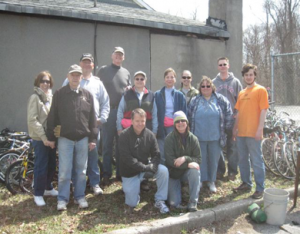
The Returned Peace Corps Volunteers of Long Island began over 20 years ago as a way to meet and reconnect with other former Peace Corps volunteers, and for the first few years was primarily social. Every year we would set aside a portion of our dues to contribute to a worthy cause. After awhile we decided that we wanted to do more. At that time, one of our members, Kathy Williams Ging, heard about Pedals through an RPCV friend who lived in New Jersey. In October of 2003, due to efforts by Kathy and Charles Bevington, we had our first collection in Hicksville, at a location that was supplied by Brian Richardson. We got to meet Dave and successfully collected 33 bikes. At our annual business meeting later that fall, we decided to make this an annual group effort. After deciding to switch our collections to the spring, we had our next collection in April, 2005. It has become an important part of our group’s activities every year since.
Over the years we’ve supplied 892 bikes and about 10 sewing machines, and enough money to cover the $10 per bike cost, usually with an additional cash donation. Many of us have been involved throughout this journey. Kathy Williams Ging, Linda Restaino Merola, Tom Montalbano, Charles Bevington and I (Bette Bass) have been coordinators through the years. We’ve held collections in both Nassau and Suffolk counties, so that more people can be involved, and we can have a larger pool of potential bikes. We have used parking lots all over Long Island, including Hauppauge Middle School, the Massapequa Public Library, a bank in Huntington, a sailing association in Sayville, a Temple in Port Washington, and a bicycle shop in Rocky Point.
We have partnered with other organizations as well: Hauppauge Middle School, in Hauppauge NY, provided a space and held cookie sales and other fund raisers for two years. Linda Restaino Merola was instrumental in obtaining the space for us. We collected so many bikes at our Huntington bank location that Linda and her husband Lou Merola stored about 30 bikes at their house overnight since they didn’t all fit on the Pedals truck. The Wet Pants Sailing Association Juniors, of Sayville, came out in force one year under Tom Montalbano’s lead—this was probably our most scenic spot, right on the water in Sayville. Last year, as part of their Mitzvah Sunday, we partnered with several Temples in Port Washington. Jerry and Nancy Federlein, both LIRPCV members, coordinated the Mitzvah Sunday. This year, Rocky Point Cycle, in Rocky Point, supplied our space. They also accepted bikes before the collection date. Lyn Dobrin, of Lyn Dobrin Ink, another LIRPCV member, has handled all of our publicity, and we have had numerous newspaper articles, radio announcements, and this year, an appearance on an NBC cable news show with Chuck Scarborough.
Over the years, we have come to regard Pedals as our own. Some of us have purchased our own tools to process bikes. Many of us have made mini collections, driving around the area picking up bikes and donations as we go. Tim Ging, Larry Hohler, Linda and Lou Merola, Tom Montalbano,and Jerry and Nancy Federlein, Bill Reed and Mary Watros have done this almost every year. Jennifer Monahan and Michael Kretschsmann have rented a small truck and brought 10 to 12 bikes and a few sewing machines a year from the East End. This has given us access to even more people and bikes. I (Bette Bass) discovered a real talent for making sure people give their $10 per bike. I enjoy explaining why it’s so important for everyone to donate. My favorite activity is using the photos Pedals sends to show children who are donating a bike just why it’s so important and how much difference it makes to other children. I feel that we’re starting a new generation of caring, giving people. As individuals, Pedals has really struck an emotional chord with each of us. We all, whether we returned 45 years ago or last week, know that transportation is one of the keys to having a better life all over the globe. Most of us were in rural areas where there are very few cars, and buses are a sometime thing. The time and effort put into just getting from one place to another takes a toll on the whole family. The addition of sewing machines to our collections was very welcome—providing someone the means to earn a living is a wonderful gift. The Returned Peace Corps Volunteers of Long Island is already planning for our next collection in April, 2012.
Happy 20th anniversary to Pedals for Progress, as we celebrate Peace Corps 50th Anniversary as well!!
From Iowa to St. Vincent: A Peace Corps Volunteer Brings more than Good Will to an Island School
By Patricia Hamill
As you may have read on our web site, we received a wonderful letter from Peace Corps volunteer Liz Deppe thanking us for making it possible for the school where she teaches to acquire 20 sewing machines. Located on the island of St. Vincent, the Barrouallie Secondary School (BSS) is the fortunate institution to welcome Liz and, hence, receive the machines. Originally from Ames Iowa, Liz has only been in St. Vincent for 8 months as an assistant to the teachers in the art and reading courses; however, in that short time, she has made an enormous difference. Having known about P4P from our work in Iowa, she decided to contact us about donations of sewing machines to incorporate into the curriculum. What can they do for employment without this skill? While banana production has dominated the economy, the government has been seeking ways of diversifying so that Vincentians do not continue to be vulnerable to price fluctuations and crop diseases. Tourism is an industry that has grown widely, but not everyone is able to profit from this type of expansion. This is where the importance of a solid education backed up by practical vocational skills comes into our story. According to Liz, “[t]hat first project and many more projects the students at BSS will work on are teaching them more than just how to sew. They are learning patience, creativity, problem-solving skills and a sense of accomplishment.” While the machines are not used for production but strictly classroom learning, there is hope that more machines can be acquired so that families may be able to purchase them and begin their own businesses. At the very least, the students have a marketable skill to offer alongside the knowledge they gain from their studies.
Liz has witnessed firsthand the lasting effect that tangible results from focused effort provide: “What I believe is the most rewarding part of our newly created sewing program is a sense of accomplishment. At a school with little resources and many struggling students, it is amazing to watch a student, who has never felt proud, show you what they have accomplished. Their face beams as they hold up the finished product, something they can use and show off.” It is part of our mission to do the utmost to send our shipments as economically as possible while striving to get the sewing machines and bikes out to those in need as quickly as possible. P4P was able to ensure that the sewing machines could make it to the school and with as little financial burden as possible by sending them via sea rather than air. The cost was demonstrably lower at $10 per piece. If all goes well, we may be able to continue this relationship not only with the school but also expand to other institutions on the island. It is Peace Corps Volunteers like Liz and people like our partners and contributors who think progressively, initiate programs, and give support that make our efforts so successful.
A One-Woman Operation
InGear Fall 2005
Scarlet Bello, or Karla as she is more widely known, owns and runs EcoBicicletas in Rivas, Nicaragua. She opened her shop 3 years ago but her relationship with Pedals for Progress goes back at least 10 years. Karla began working with P4P’s partner Grupo Sofonias in Jinotepe, Nicaragua in 1997. Karla was the manager of the bicycle shop. As such she was in charge of everything from inventory, pricing to selling bicycles. Karla was able to create a viable business for Grupo Sofonias while selling quality bicycles to people in need of transportation.
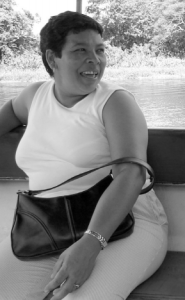
In addition to being a wife, mother of 2 children and working full time, Karla attended the University in Managua to receive her degree in Accounting. She wanted to get a better understanding of how to run a business from the inside out. She already had the practical know-how of running a business but wanted to get the academic training as well. Due to medical problems in 2002 Karla was unable to continue working for Grupo Sofonias. This is where she becomes an exception to the normal custom in Nicaragua. Once Karla had recovered and was able to work, she and her husband decided to open another bicycle shop in their home town of Rivas. For Karla the bicycle business is her lifeline. She explained to me that “As a woman over the age of 35 in Nicaragua, I am condemned to a life of unemployment in the professional sector, unless I work for myself.” For professional women in Latin American countries this is all too common. The job market caters only to single women under the age of 35.
Karla lives and breathes the bicycle business. She loves every aspect of her work. With her expressive face she explained all of her roles in EcoBicicletas. When a container of bicycles arrives in Rivas from Pedals for Progress, Karla must travel to Rivas (about 30km) daily for 10 days straight. The process of unloading, sorting and pricing the bikes is all overseen by Karla. Once the bikes are ready to sell, Karla keeps the warehouse and what she has sold.
She also prepares the accounting books for review by the company’s accountant. It is very difficult to fake the enthusiasm I saw in her face and the words she used to describe her business. What I most admire about Karla is that she is a business woman who understands market-driven prices and how to keep her operating costs down, but more importantly she is a very compassionate and trusting employer. “I treat my employees as if they are part of my family. I give them a bonus at the end of the year, buy them birthday presents, and even help some pay for their children to go to school. If I show them that I respect them, I will never have any problems in my shop.” Out of her 5 employees, 3 of them are single mothers who would also be subject to the same job market restrictions Karla was subject to when she returned to work after recovering from her medical condition. Since 2002 Karla has been able to sell around 1,500 bikes per year. EcoBicicletas does not even need to advertise their products; the people know when the new bikes arrive in Rivas. Due to her success in Rivas, Karla has opened a second shop in Nandaime, a smaller city than Rivas, but she is able to sell around 50 bikes a month there.
There has been somewhat of a phenomenon in Nandaime with the bicycle repair and parts businesses. They have seen almost twice the amount of customers since EcoBicicletas has come to town. The positive economic effects of EcoBicicletas can be seen in many ways. What does Karla enjoy most about owning EcoBicicletas? “When I see a mother who does not have a lot of money come to my store and she is able to buy a quality bike for her child, one that she knows will last and let her child go to school, that is the best part. To see her expression of pride that she was able to get this bicycle, that is why I do this.” Karla also takes great pride in the sewing machines that she donates to people and organizations in need. She has been to known to give some to the “House of the Woman” in Nandaime, so now they can hold courses at no cost to women who want to learn how to sew. There are several under-funded technical high schools around Rivas that have benefited from the sewing machines as well. This is her way of giving back to her community, her social responsibility.
As an overseas partner of Pedals for Progress, Karla has been able to accomplish many goals that women in most developing countries are not able to do. She is her own boss, trusting employer and teacher. Karla’s story is one of self-empowerment through something as simple as selling bikes. Karla has been able to create an independent life for herself and her family and helped her community by partnering with Pedals for Progress. EcoBicicletas is a definite success story for Pedals for Progress, but this success would not have been possible without Karla’s careful direction and dedication.
It’s More Than Luck for this Lottery Ticket Seller
by Nguyen Van Hanh
Winter 2011 InGear
 Mr. Tran Van Oanh, 56 years old, was born to a poor family in Vung Liem district, in the Mekong province of Vinh Long, 180 km west of Ho Chi Minh City. In addition to his economic hardship, he was born with a hearing impairment. By the late 1980s, he was married and became the father of two children. During the 1990s, he took on many different kinds of work, including masonry and cutting rice for land owners. Even with this effort and hard labor, he could hardly earn enough to feed his family. By 2000, he became ill and weak and could no longer do hard work, so he took on a job as a lottery ticket seller, a popular job in the poor region of Mekong Delta. Most of the family’s income is still generated from his occupation.
Mr. Tran Van Oanh, 56 years old, was born to a poor family in Vung Liem district, in the Mekong province of Vinh Long, 180 km west of Ho Chi Minh City. In addition to his economic hardship, he was born with a hearing impairment. By the late 1980s, he was married and became the father of two children. During the 1990s, he took on many different kinds of work, including masonry and cutting rice for land owners. Even with this effort and hard labor, he could hardly earn enough to feed his family. By 2000, he became ill and weak and could no longer do hard work, so he took on a job as a lottery ticket seller, a popular job in the poor region of Mekong Delta. Most of the family’s income is still generated from his occupation.
Although unable to hear, he can speak and is very friendly and does relatively well, but it still remains hard for him to afford food and other expenses for the family. Many people do buy lottery tickets from him, sometimes not because of their interest in the game but because of his circumstances. He has to walk from dawn to dusk around 25-30 km in the district to sell the tickets. He can sell around 100 tickets every day and earns around 5 U.S. dollars.
At the end of July 2011, he was granted a bicycle, donated by Pedals for Progress through The Dariu Foundation (TDF) and Vinh Long Friendship Organization, and has used the bicycle for his job since then. The Dariu Foundation is a Swiss non-government organization, operating in Vietnam since 2003 with a focus on poverty reduction and education development through programs of microfinance, scholarships for poor students, building kindergartens, and offering training in computer skills to rural students. Mr. Tran is one among more than 500 poor families in Vinh Long province who are lucky enough to get the donated bicycles from P4P through The Dariu Foundation. This was the first shipment by P4P to Vietnam, and the next one is expected to be shipped this November.
Today, there are more than 15,000 households benefiting from TDF’s microfinance services, served by a portfolio of 2.1 million U.S. dollars. “I am very happy because firstly it is a very nice and good bike. Secondly, it is my dream to have a bike to help my job be much more convenient. And lastly it helps double my sales and income. Previously, I just earned $4.00-$5.00 per day, but now I can gain $10.00 a day,” said Mr. Tran. “I hope I can soon earn and save enough money to pay for my wife’s surgery. Now I can go home early to help my wife with housework and take care of the family,” he added.
Good News from Kyrgyzstan!
When we initiated new programs we very diligently investigate our potential new partner. The 1st obvious reason is to select the best partners overseas. The 2nd reason is we realize, especially with sewing machine programs, we have very little ability to monitor many of these far-flung programs. In fact, to monitor the program is often more expensive than supplying the program. We have a basic understanding at P4P that we do not send gringos overseas. The material we ship is appropriate technology, they do not need technical support from us. We are much more effective using our limited funding for shipping as much material as possible.
Longtime readers of our web site and newsletters will probably remember in 2008 with some assistance from the Clif Bar Family Foundation we sent a consignment of sewing machines to a Peace Corps volunteer in Kyrgyzstan. Kyrgyzstan is one of those geographical locations that we don’t happen to pass by often. When PCV Roberto left Kyrgyzstan, we lost contact with the sewing machine program.
I never lost faith that the sewing machine project in Cholpon-Ata could be successful, I just knew that I had no way to find out. I was so pleased this weekend to receive the following e-mail and photographs.
David,
I’m happy to report the sewing cooperative is functioning as both a producer of linens and a training center unemployed women who are interested in taking up sewing. The Peace Corps volunteer there forwarded me some new up-to-date pictures. Rob
Even though sometimes I do not get the story and photographs back quickly, to the community the bicycles and sewing machines we ship are so vitally important that they are made use of. To those of you who donated funding and or sewing machines in 2008, thank you from our staff and the employed women of Cholpon-Ata.
Dave Schweidenback


